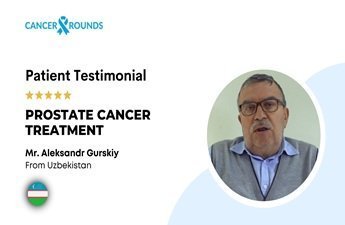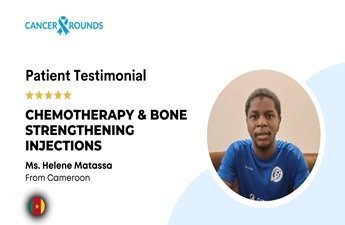Prostate Cancer Treatment in Turkey
Prostate cancer is one of the most common cancers in men, originating in the prostate gland, a small organ located below the bladder. It primarily affects men over 50 and develops when abnormal cells in the prostate begin to grow uncontrollably.
Globally, it is a leading cause of cancer-related deaths among men—but early diagnosis and advanced treatment significantly improve survival outcomes.
In Turkey, prostate cancer awareness and screening rates have increased remarkably, supported by modern diagnostic technologies, expert urologic oncologists, and internationally accredited hospitals. This has positioned Turkey as one of the best destinations worldwide for prostate cancer treatment, combining cutting-edge medical care with affordable pricing.
Incidence of Prostate Cancer in Turkey
- According to a national epidemiological study in 2008-2009, the age-adjusted incidence of prostate cancer in Turkey was about 35 cases per 100,000 men.
- The median age at diagnosis in this study was 68 years.
- Over recent years, the incidence in Türkiye has been increasing: from approximately 24.9 per 100,000 in 2004 to about 40.3 per 100,000 by 2018.
- Mortality rates have also shown trends, though improvements in detection and treatment are contributing to stabilisation in some age groups.
Symptoms and Signs
Prostate cancer is often known as a silent disease because it may not cause noticeable symptoms in its early stages. Many men discover it only during routine screening or preventive health checkups. However, as the disease progresses, certain urinary and sexual symptoms may appear that warrant prompt medical evaluation.
Common warning signs of prostate cancer include:
- Frequent urination, especially at night (nocturia)
- Weak or interrupted urinary stream, or dribbling at the end of urination
- Difficulty starting or stopping urination, even when the bladder feels full
- Pain or burning during urination (dysuria) — often mistaken for infection
- Blood in urine or semen (hematuria or hematospermia) — a key sign that should not be ignored and requires immediate prostate evaluation by a cancer specialist
- Discomfort or dull pain in the pelvic area, hips, or lower back
- Erectile dysfunction or difficulty maintaining an erection
Because these symptoms may overlap with benign conditions such as benign prostatic hyperplasia (BPH) or prostatitis, a thorough diagnostic workup — including PSA testing, digital rectal examination, MRI, and prostate biopsy — is essential to confirm or rule out prostate cancer.
If you or a loved one experience any of these symptoms, early consultation can make all the difference.
Diagnostic Workup for Prostate Cancer in Turkey
For a precise diagnosis and accurate staging, Turkey’s leading cancer hospitals and urology clinics utilize state-of-the-art diagnostic technologies designed to detect prostate cancer at its earliest and most treatable stages. The diagnostic process is handled by expert urologic oncologists, radiologists, and pathologists, ensuring that every patient receives a personalized and evidence-based evaluation.
Step-by-Step Diagnostic Process
- PSA Test (Prostate Specific Antigen): The PSA blood test is the most common initial screening for prostate cancer in men over 50. Elevated PSA levels may indicate prostate enlargement, inflammation, or cancer, prompting further imaging or biopsy.
- Digital Rectal Examination (DRE): A simple, quick, and effective method for detecting prostate abnormalities such as hard nodules or irregularities that could suggest cancerous changes.
- Advanced Imaging Techniques: Turkey’s oncology centers use cutting-edge imaging systems to pinpoint tumor size, location, and spread:
- Multiparametric MRI (3T MRI): Provides detailed images of the prostate structure and surrounding tissues.
- Transrectal Ultrasound (TRUS): Guides biopsies and visualizes suspicious lesions.
- CT Scan & Bone Scan – assess local and distant metastasis.
- PET-CT / Ga-68 PSMA PET-CT: Advanced molecular imaging for metastatic or recurrent prostate cancer, available in major Turkish cities like Istanbul and Ankara.
- Prostate Biopsy: If imaging or PSA results are suspicious, a prostate biopsy confirms the diagnosis. Transrectal ultrasound-guided biopsy (TRUS biopsy) or fusion-guided biopsy are the standard approaches in Turkey. Tissue samples are analyzed for cellular abnormalities, determining whether cancer is present. The average biopsy cost in Turkey is around USD 1,500–3,500.
- Histopathological Grading: Laboratory experts evaluate biopsy samples to determine the Gleason Score and ISUP Grade Group, which classify tumor aggressiveness. Low-grade cancers (Gleason ≤6) are often monitored under active surveillance and High-grade tumors (Gleason ≥8) may require surgery, radiation, or combination therapy.
Staging Investigations
Staging defines how far the cancer has spread:
- T1–T4: Local tumor extent
- N stage: Lymph node involvement
- M stage: Distant metastasis (bones, lungs, liver)
This helps doctors design a tailored prostate cancer treatment plan for each patient.
Typical imaging package cost in Turkey: USD 1,000–4,000 depending on tests performed.
Efficient & Patient-Friendly Diagnostics for International Patients
Top prostate cancer hospitals in Turkey — such as those in Istanbul, Ankara, and Izmir — are known for their rapid diagnostic turnaround times. International patient coordinators ensure:
- Same-day appointments for PSA tests and imaging
- English-language pathology and radiology reports
- 24–48-hour report delivery for most tests
- Multilingual support and online consultation follow-up
With affordable costs, fast scheduling, and world-class diagnostic equipment, Turkey has become a global hub for prostate cancer detection and staging.
Doctors For Prostate Cancer
Need More Recommendations ?
Advanced Prostate Cancer Treatment Options in Turkey For International Patients
Turkey has emerged as a global leader in comprehensive prostate cancer care, offering a perfect blend of clinical excellence, modern technology, and cost-effectiveness. The treatment approach is highly individualized — based on the stage of cancer, the patient’s overall health, and personal preferences — ensuring the best possible outcomes with minimal side effects.
At the top prostate cancer hospitals in Turkey, multidisciplinary teams consisting of urologic oncologists, radiation oncologists, and medical oncologists collaborate to design a personalized treatment plan for every patient.
1. Active Surveillance for Early-Stage Prostate Cancer
For patients diagnosed with low-risk or slow-growing prostate tumors, Turkish specialists often recommend active surveillance — a carefully monitored, non-invasive management strategy.
- Regular PSA testing, MRI scans, and clinical evaluations help track any disease progression.
- This approach avoids unnecessary procedures while maintaining quality of life.
Ideal for early-stage prostate cancer detected incidentally during routine screening.
2. Surgical Treatment – Radical Prostatectomy
Surgery remains the cornerstone of curative prostate cancer management.
- Radical Prostatectomy involves the complete removal of the prostate gland and surrounding tissues.
- Turkey’s leading hospitals specialize in open, laparoscopic, and robotic-assisted (da Vinci system) prostate surgeries.
Robot-assisted radical prostatectomy (RARP) in Turkey is performed using the latest da Vinci Xi platforms, offering:
- Unmatched precision
- Minimal blood loss
- Faster recovery and shorter hospital stay
- Enhanced preservation of urinary continence and sexual function
Average cost of robotic prostatectomy in Turkey: USD 7,000–13,000
3. Radiation Therapy – Precision Without Incision
For patients unsuitable for surgery or preferring non-surgical options, radiation therapy is a cornerstone of treatment.
Turkish cancer centers use next-generation radiotherapy technologies, including:
- IMRT (Intensity-Modulated Radiation Therapy) – Tailored radiation beams that conform precisely to the tumor’s shape.
- VMAT (Volumetric Modulated Arc Therapy) – Rapid and accurate delivery with reduced side effects.
- SBRT (Stereotactic Body Radiation Therapy) – High-dose, image-guided radiation delivered in 1–5 sessions.
- Tomotherapy – Combines CT imaging and radiation for superior accuracy.
Highly effective in localized and locally advanced prostate cancer with minimal impact on nearby organs like the bladder and rectum.
4. Brachytherapy (Internal Radiation Therapy)
Brachytherapy involves implanting tiny radioactive seeds directly into the prostate gland.
- Provides targeted radiation with minimal exposure to surrounding tissues.
- Often completed in a single session under anesthesia.
- Excellent long-term cancer control with minimal side effects.
Average brachytherapy cost in Turkey: USD 4,500–7,500
5. Hormone Therapy (Androgen Deprivation Therapy – ADT)
Hormone therapy aims to reduce testosterone levels, the fuel that drives prostate cancer growth.
- Used in advanced, metastatic, or recurrent cases.
- May be administered as injections, oral medications, or surgical castration (orchiectomy).
- Often combined with radiation therapy to enhance outcomes.
Modern centers in Turkey use long-acting hormone formulations for convenience and effectiveness.
6. Chemotherapy and Targeted Therapies
For advanced or hormone-resistant prostate cancer, chemotherapy and targeted therapies play a key role.
- Docetaxel and Cabazitaxel are the most commonly used chemotherapy agents.
- Targeted therapies and immunotherapy options like PARP inhibitors or PSMA-directed treatments are also available in major Turkish oncology institutions.
Patients benefit from globally approved cancer drugs at affordable Turkish prices.
7. Combination and Multimodal Therapy
Many patients achieve optimal results with combined treatment approaches, such as:
- Surgery + Radiation Therapy
- Radiation + Hormone Therapy
- Targeted Therapy + Immunotherapy
Multidisciplinary tumor boards in Turkey ensure that every treatment plan is scientifically validated, evidence-based, and patient-centered.
Treatment Cost Range in Turkey
Turkey offers significantly lower costs for prostate cancer treatment compared to Western countries, while maintaining high standards in medical care, facility accreditation, and surgeon expertise. Here are typical costs:
| Procedure / Component | Approximate Cost (USD / EUR) in Turkey* |
| Diagnostic tests: PSA, MRI, CT, bone scan, biopsy | $1,000-4,000 ≈ €800-€3,500 depending on imaging modality and complexity. |
| Robotic prostatectomy (da Vinci or similar) | $7,000-13,000 approx. ≈ €6,000-€12,000. |
| Open / Laparoscopic radical prostatectomy | Slightly lower than robotic, depending on hospital, surgeon. |
| Radiation therapy (full course) | $3,000-8,000 depending on number of sessions, technology (IMRT, VMAT etc.) |
| Brachytherapy | $4,500-7,500 approx. |
| Chemotherapy / Hormone therapy / Targeted therapy (per cycle or year) | Chemotherapy cycles: $800-2,500; Hormone therapy or targeted drug therapy may vary depending on drug: few thousand dollars per year. |
* Note: Final cost depends on hospital (private or public), city (Istanbul, Ankara, Izmir etc.), surgeon experience, duration of stay, lodging, pre-/post-operative care, and whether international patient services are included.
For an international patient, for instance, a patient is undergoing robotic radical prostatectomy + preoperative diagnostics + hospital stay + follow-ups in Istanbul, total cost might be in the range USD $11,000-$20,000 (or equivalent in euros / lira), depending on hospital, and inclusive of international patient package.
Diagnostic Cost Range in Turkey
Some breakdowns for diagnostic workup:
- PSA + blood tests + basic labs: a few hundred USD/euros
- MRI of prostate: ~ $1,000-1,500 in many advanced centers depending on strength (3T etc.)
- PET-CT (or Ga-68 PSMA PET-CT) for advanced disease or suspected metastasis: $2,500-4,500 approx.
- Prostate biopsy (transrectal / fusion): $1,500-3,500 depending on method.
Combined diagnostic package (consultation + imaging + biopsy + labs) typically runs between $3,000-7,000 for international patients, depending on facility and comprehensiveness.
Why Should International Patients Choose Turkey for Prostate Cancer Treatment?
- High medical quality & advanced technology: Many hospitals in Turkey have international accreditation (e.g. JCI), modern imaging, robotic surgery systems and experienced urologists / oncologists.
- Lower cost with comparable outcomes: Treatment & diagnostic costs in Turkey are often 50-70% lower than in Western Europe or USA for similar procedures.
- Shorter waiting times and streamlined international patient services: Hospitals catering to medical tourism often provide coordination, interpreters, visa assistance, accommodation packages etc.
- Location and accessibility: Turkey is geographically well-positioned for patients from Europe, the Middle East, Asia, and Africa. Good transport infrastructure (direct flights etc.).
- Comprehensive care with multidisciplinary teams: Treatment planning often involves urologists, oncologists, radiologists, pathologists, nursing, rehabilitation etc.
- Cultural, comfort, tourism opportunity: Many patients combine treatment with recuperation in a cultural setting; Turkey offers good hospitality, recovery facilities, and tourism options (if desired).
What to Expect in Terms of Cost & Treatment Timeline (For International Patients)
- Pre-treatment phase: diagnostic workup (PSA, imaging, biopsy etc.) – about 1-2 weeks to get all tests done (for international patients, might require coordination and sometimes travel).
- Treatment phase: depending on treatment modality: surgery is usually a one-time procedure with hospital stay of a few days; radiation therapy may require daily sessions over several weeks; hormone / targeted therapy cycles may be over months.
- Recovery / follow-up: after surgery, patient may stay in hospital for 2-7 days; catheterization; follow-ups, potential side effect management; radiation therapy may require side effect control; overall recovery varies (2-6 weeks or more depending on case).
Choosing the Best Cancer Clinic / Hospital in Turkey
When comparing options, international patients should check:
- Accreditation (JCI, national / international oncologic / cancer centre credentials)
- Surgeon experience (number of prostatectomies done, especially robotic / minimally invasive)
- Treatment modalities offered (robotic surgery, advanced radiation therapy, brachytherapy etc.)
- Diagnostic accuracy (high-quality MRI, PET imaging if needed)
- Cost transparency (what is included: lodging, follow-ups, medicines)
- Patient reviews, success rates, survival outcomes
- Support services (language, accommodation, visa assistance)
Turkey offers a compelling option for prostate cancer treatment combining modern diagnostics, experienced medical teams, advanced treatment options (robotic surgery, radiotherapy, brachytherapy), and significantly lower costs compared to many Western nations. For international patients who value quality, speed, and cost-effectiveness, Turkey can be an excellent destination.
FAQs about Prostate Cancer Treatment in Turkey
1. Why is Turkey a popular destination for prostate cancer treatment?
Turkey has become one of the top destinations for prostate cancer treatment due to its world-class hospitals, internationally accredited urologists, advanced robotic surgery systems (da Vinci), and affordable costs compared to Western countries. Patients receive personalized treatment plans, quick diagnostic turnaround, and English-speaking care teams.
2. How much does prostate cancer treatment cost in Turkey in 2025?
The cost of prostate cancer treatment in Turkey varies based on the treatment type and hospital:
- Robotic radical prostatectomy: $7,000–13,000 USD
- Brachytherapy: $4,500–7,500 USD
- Radiation therapy (IMRT/VMAT): $5,000–10,000 USD
- Hormone therapy or chemotherapy: $1,000–3,000 USD per cycle
These prices are 50–70% lower than in the USA or UK.
3. What are the best hospitals for prostate cancer treatment in Turkey?
Some of the top prostate cancer hospitals in Turkey include:
- Acıbadem Healthcare Group (Istanbul, Ankara)
- Medipol Mega Hospital
- Anadolu Medical Center (affiliated with Johns Hopkins Medicine)
- Memorial Şişli Hospital
- Liv Hospital, Istanbul
These hospitals feature robotic surgery suites, advanced radiotherapy technologies, and international patient services.
4. What types of prostate cancer treatments are available in Turkey?
Turkey offers comprehensive prostate cancer management, including:
- Active surveillance for early-stage cases
- Radical prostatectomy (open, laparoscopic, robotic-assisted)
- IMRT, VMAT, and SBRT radiation therapy
- Brachytherapy (internal radiation)
- Hormone therapy (ADT)
- Chemotherapy, targeted therapy, and immunotherapy
5. Is robotic prostatectomy available in Turkey?
Yes. Many Turkish hospitals offer da Vinci robotic prostatectomy, performed by fellowship-trained urologic oncologists.
Benefits include greater precision, minimal blood loss, faster recovery, and better functional outcomes (continence and potency preservation).
6. How long should I stay in Turkey for prostate cancer treatment?
For surgery, patients typically stay 10–14 days in Turkey (including recovery).
For radiation therapy, treatment duration is about 4–6 weeks, depending on the number of sessions.
Most hospitals assist with cancer rounds- the help for visa, airport transfers, accommodation, and follow-up arrangements.
7. Are prostate cancer treatments in Turkey safe and internationally approved?
Yes. Leading Turkish hospitals follow European Association of Urology (EAU) and NCCN guidelines. They use FDA- and EMA-approved technologies and internationally certified radiotherapy systems, ensuring safety, efficacy, and global standards of care.
8. Can international patients get their diagnostic tests done in Turkey?
Absolutely. Most hospitals in Turkey offer fast-track prostate cancer diagnostic packages including PSA test, digital rectal exam, MRI, PET-CT, and prostate biopsy. Results are typically available within 48–72 hours, and reports are provided in English for international patients.
9. What advanced technologies are used for prostate cancer treatment in Turkey?
Turkey’s oncology centers use cutting-edge diagnostic and therapeutic tools, such as:
- Multiparametric MRI and Ga-68 PSMA PET-CT for staging.
- Da Vinci robotic system for precise prostate surgery.
- IMRT, SBRT, and Tomotherapy for high-precision radiation.
- PSMA-targeted radionuclide therapy and PARP inhibitors for advanced cases.
10. How can I start my prostate cancer treatment journey in Turkey?
You can begin by contacting Cancer Rounds team to connect with trusted prostate cancer specialist or hospital in Turkey with your medical reports (PSA levels, MRI, biopsy results). The Cancer Rounds team will:
- Review your case
- Provide a personalized treatment plan and cost estimate
- Assist with medical visa, travel, and accommodation arrangements
5 easy Steps to Get Treated in Turkey

Share Case Details

Get Expert Opinion and Hospital Quotes

Get Visa Invitation & Hotel Recommendations

Get Received At Airport and Start Your Treatment

Travel Back and Get Followups Through Us
Connect with Cancer Rounds
Cancer Rounds assists international patients in navigating the entire journey of prostate cancer treatment in Turkey:
- Hospital selection based on stage and treatment type
- Cost estimation and transparent treatment planning
- Visa, travel, and accommodation assistance
- Continuous telemedicine follow-up post-treatment
“Your journey to healing starts here. Let Cancer Rounds guide you every step of the way.”
You May Be Also Interested In
All Treatment Pages
Related Patient Stories

I was battling prostate cancer and back pain when I found Cancer Rounds. They were incredibly helpful, handling everything from the visa to the treatment and hotel stay. I am truly grateful for their support.

Thanks to Cancer Rounds, I got timely prostate cancer care in India. From fast visa help to expert treatment, everything was handled smoothly. My PSA dropped from 254 to 1, & I’m truly grateful.

I came from Cameroon with Cancer Rounds’ help. Thanks to Dr. Rajat Bajaj at Fortis, I’m walking again and feeling much better.
Our Impact
CancerRounds is making quality cancer care accessible to more people every day.




Why Choose India for Cancer Treatment?

World-Class Care
Skilled oncologists provide top-tier medical services

Affordable Treatment
Costs are significantly lower than in Western countries.

Comprehensive Packages
Hospitals offer all-inclusive plans covering surgery, stay, and aftercare.

Easy Accessibility
Well-connected airports and international flight routes.

Proven Success
High patient satisfaction and positive treatment outcomes
Thank You!
Your form has been submitted successfully.



 Chat on WhatsApp
Chat on WhatsApp